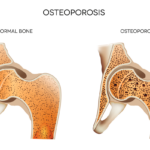Kristine Ensrud, MD, and John Schousboe, MD, PhD, from University of Minnesota note that during the COVID-19 pandemic, some organizations recommend transitioning to an oral bisphosphonate in patients on denosumab who can’t continue on time.
“Patients discontinuing denosumab treatment should transition to an alternative antiresorptive medication. The optimal timing and dosing of antiresorptive therapy after denosumab withdrawal is currently being investigated in randomized trials,” they write.
ad goes here:advert-1
ADVERTISEMENT
SCROLL TO CONTINUE
References
- Lyu H, Yoshida K, Zhao SS, et al. Delayed denosumab injections and fracture risk among patients with osteoporosis: A population-based cohort study. Ann Intern Med. 2020 Jul 28. Online ahead of print.
- Lyu H, Yoshida K, Zhao SS, et al. Delayed denosumab injections and bone mineral density response: An electronic health record-based study. J Clin Endocrinol Metab. 2020 May 1;105(5):1435–1444.
- Ensrud KE, Schousboe JT. Delayed denosumab injections and fracture risk. Ann Intern Med. 2020 Jul 28. Online ahead of print.

